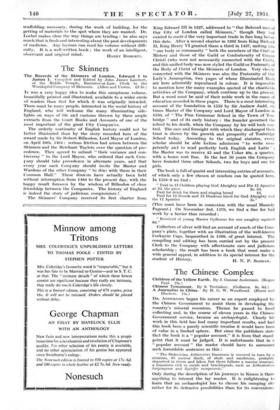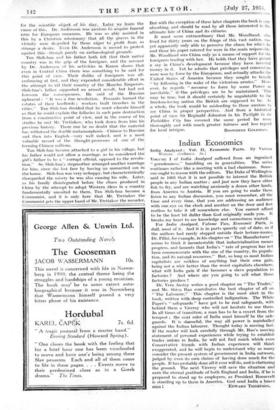The Chinese Complex
Children of the Yellow Earth. By J. Gunnar Andersson. (Kogan Paul. 25s.)
Chinese Testament. By S. Tretiakov. (Gollancz. 8s. 6d.) Da. ANDERSSON began his career as an expert employed by the Chinese Government to assist them in developing the country's mineral resources. Thence he passed to fossil collecting and, in the course of eleven years in the Chinese Government service, became an archaeologist. Clearly his work in this field has had many important results, and had this book been a purely scientific treatise it would have been of value in a limited sphere. But since the publishers state that the book is a " popular account," it is from that stand- point that it must be judged. It is unfortunate that in a " popular account " the reader should have to surmount such formidable sentences as this :
" The Ordovician Actinoceras limestone is covered in turn by a stratum, 85 metres thick, of shale and sandstone, probably deposited in rivers and lakes, but there follows a marine stratum, a limestone rich in corals and brachiopods, such as Lithostrotion kaipingense and Spirifer mosguensis."
Only during the description of his journeys in Kansu is there anything to interest the lay reader. It is enlightening to - learn that an archaeologist has to choose his camping site rather for its defensive possibilities than for its convenience
for the scientific object of his stay. _Later_ we learn the cause of this. Dr. Andersson was anxious to acquire funeral urns for European museums. He was so ably assisted ie this by a Christian missionary that all the graves in the vicinity were despoiled by those eager Aci profit from so strange a desire. Even Dr. Andersson is moved to protest against this—though purely on archaeological grounds.
Tan Shih-hua and his father both felt that their native country was in the grip of the foreigner, and the account by Dr. Andersson of his activities in Kansu shows that even in Central China there was something to be said for this point of view. Their dislike of foreigners was all- embracing at first, and they expended considerable effort in the attempt to rid their country of the Manchu Emperors. Shih-hua's father supported an armed revolt, but had not foreseen the consequences. He said of the Russian upheaval : " It was a fine revolution. Peasants burned the estates of their landlords ; workers built trenches in the cities." Tan Shih-hua decided that he must educate himself so that he could explain the fallacies in such pure destruction from a constructive point of view, and in the course of hia studies he met Mr. Tretiakov, who took down from him his previous history. There can be no doubt that the material* has withstood the double linetamorphcisis—Chinese to Russian: and then into English—very well indeed, and is a most valuable record of the thought-processes of one of the teeming Chinese millions.
Tan Shih-hua became attached to a girl in his -village, but his father would not allow a marriage, as he considered the: girl's father to be a corrupt official, opposed to the revolu-. tion." So Shih-hua's stepmother arranged another marriage for him,. since she lost face by having an unmarried son in the house. Shih-hua was very unhappy, but characteristically disregarded the misery he was also causing his wife. Later,. as his family disintegrated before the chaos produced in China by the attempt to adopt Western ideas in a country, fundamentally unsuited to them, Tan Shih-hua became a: Communist, and it is only here that Mr. Tretiakov the Communist gets the upper hand of Mr. Tretiakov the recorder. But with the exception of these later chapters the book is very absorbing, and should be read -by all those interested in the ultimate fate of China and its citizens.
It must seem extraordinary that Mr: Woodhead, who lived for thirty years on the fringe of this vast nation, was yet apparently only able to perceive the chaos for which he and those his paper catered for were-in the,main responsible. Mr. Woodhead sees China only as-a means of support .for the foreigners trading with her. He holds that they have gained a say in China's development because they have invested money in it. Yet he admits that privileges and concessions were won by force by the Europeans, and actually attacks the United States of America because they sought to benefit " by following in the wake of the victorious armies." How- ever, he regards " recourse to force by some Power as inevitable," if,the privileges are to be maintained. ' This may be true, - but it should certainly be unpalatable to the freedom-loving nation the British are supposed to be. As a whole, the book would be misleading to those anxious to see China in prOPer perspective. And from a histOrieal point of view Sir Reginald 'Johnston in his Twilight in the Forbidden City has covered the same period far more thoroughly and with much greater fairness and less regard



































 Previous page
Previous page